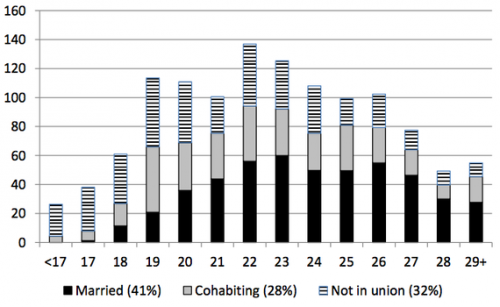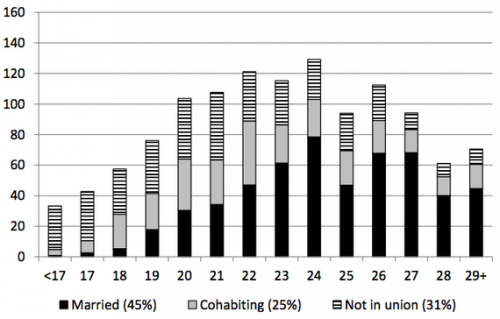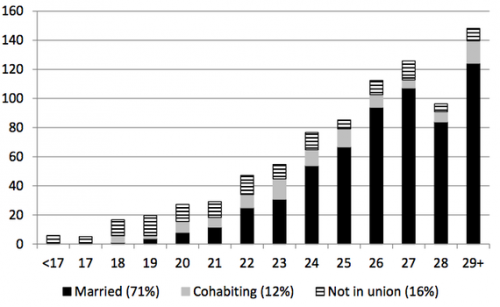Everyone!
Well, almost.
Andrew Cherlin and his colleagues report that 64% of women and 63% of men have had at least one child out of wedlock. The dominance of non-marital births is true for everyone, except people with four-year college degrees.
Cherlin’s charts each present the same data — births by age and relationship status — for women who didn’t finish high school (figure one), high school grads (figure two), women with some college (and so on), and women with a bachelors (etc). There’s some differences between the first three graphs, but the big leap comes with the last.
Didn’t finish high school:
High school grads: Some college:
Some college: College grads:
College grads:
“There are two clear paths through adulthood,” Cherlin told The Altantic, “one for people who have a bachelor’s degree and one for people who don’t.”
Thanks for the link @theologybird!
Lisa Wade, PhD is an Associate Professor at Tulane University. She is the author of American Hookup, a book about college sexual culture; a textbook about gender; and a forthcoming introductory text: Terrible Magnificent Sociology. You can follow her on Twitter and Instagram.

Comments 11
Bill R — July 12, 2014
The defining line in America today is not gender or race or political party, it's college degree or not.
Everything turns on education. Even unemployment is significantly higher for the have nots these days.
In the future, the uneducated will have a very hard time in America...
guest — July 12, 2014
The graphs don't explain the y axis. Is it thousands of women? And the percentages aren't explained either. Is that for women of all ages in that category?
Geoff Smith — July 12, 2014
This doesn't make any sense... almost no one under 21 has a college degree so having a college degree or not can't possibly be causal for having a kid under that age. I would guess that it's more likely that having a kid is more causal to people not getting a college degree, though it seems most likely that there is some underlying causality for both. Poverty most likely. I would guess what these charts actually shows is that poor people have a related collection of situations, and I suspect a chart that showed something like home ownership would look similar to these charts, with lower home ownership being related to more out of wedlock births.
Karen — July 12, 2014
I would have liked to see some statistics about people who have children out of wedlock but go on to finish their bachelor's degree. I myself did and so have many of my friends. I think most people are waiting to finish college before getting married and that's why the data looks like it does but I don't think having a child out of wedlock is as much of an educational divide as these stats show it to be.
Angela Brett — July 12, 2014
If there's cause and effect here, which way does it go? I imagine those who have kids early (and the first three graphs do show a lot of earlier births) are less likely to have the time and resources to finish school. Similarly, married or cohabitating people might be more able to finish college if their spouse can cover some bills in the mean time.
There are two clear paths through adulthood: one for people who have a baby before they finish their education and one for people who don’t.
Jen — July 12, 2014
Is that 64% of ALL women / men or 64% of moms / dads? I believe this is perhaps a very poorly worded article? "Only 60% of Americans 18-40 have kids so obviously not 60% of all people have had a kid out of wedlock. Perhaps it means 60% of that 60%?
Meditor — July 13, 2014
It's about the social reality people inhabit and the likely outcomes they see for themselves, correctly assuming their lives will be like the lives of other people they know. If you are on the periphery of the economic system, you are less invested in it, and more likely to find alternative ways of being.
One could confuse correlation with causality, as our government policies do, and say that out of wedlock pregnancies could be prevented by encouraging young women to get more education, but that is simply not the relationship. Education is correlated with wealth and status, but driving more people to get a college degree simply degrades the market value of a college education, driving debt for young people.
If your life seems constructed in a way to encourage long term goals and deferred reward, you'll follow a cluster of culturally approved behaviors, as will most of your peers. If your life will be better served by having several babydaddies, and the familial and social support they can bring, you'll orient yourself toward those resources. If you do that, at some point a college educated person will gather data about you, organize it, and try to make policy or other evaluations, which too often simply rationalize what the researcher or analyst already believes about the order of the social world. A very important group is lost, as a Karen pointed out, people who inhabit the many spaces between the administrative class and the poor. Community colleges are often entry points for young, frequently single, women to work their way to the education that people only somewhat better off have as free choice. Great graphs, and as always, a great SI post.